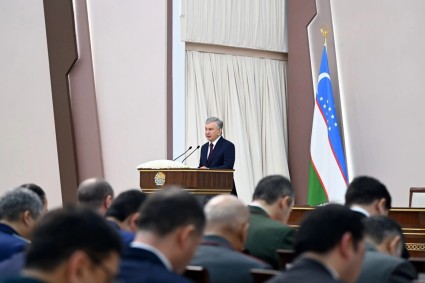The Senate at its September 20 session passed amendments on harsher measures to protect against domestic violence. According to the Senate, the amendments were developed based on the World Bank's recommendation to improve the effectiveness of measures to prevent harassment and violence against children and women, and to improve the spiritual and moral atmosphere in families.
The Chairperson of the Senate Committee on Women and Gender Equality Malika Kadirkhanova reported that there were still some shortcomings in the area of вАЛвАЛprotection against domestic violence.
"Not only adults, but also children are subject to domestic violence. However, the provisions of the current Administrative Liability Code and the relevant articles of the Criminal Code stipulate that a spouse, ex-spouse, a person living together on the basis of a single household, or a person with a common child may be a victim of domestic violence. However, children are not in this list," she said.
According to her, as a result, various problems arise in the investigative bodies when qualifying criminal cases against children who have been subjected to domestic violence.
In this regard, the amendments proposed to supplement the Article 59-2 of the Code of Administrative Liability and Article 126-1 of the Criminal Code by a provision establishing liability for committing family (domestic) violence against a child.
According to WHO, every third woman in the world is subjected to physical harassment by her spouse. In 38% of cases, death as a result of harassment and violence occurs due to the fault of the spouse or the person living with him.
In Uzbekistan, 55.6%, or 506 out of 894 crimes related to domestic violence committed from 2023 to May of this year, were terminated due to reconciliation of the parties. The court issued relevant sentences for the remaining 44.4%, or 388 crimes.
In addition, a procedure is being added for filing a request for reconciliation in cases involving family (domestic) violence at the trial stage, rather than at the inquiry and preliminary investigation stage.
That is, it is established that an application for reconciliation in cases involving family (domestic) violence can be filed at any stage of the trial, but before the court retires to the deliberation room.
“Why is this necessary? At the investigation stage, as a result of the couple’s reconciliation, the accused party does not feel the inevitability of punishment and commits violence again within a year,” said Malika Kadirkhanova.
Senate speaker Tanzila Narbaeva said that these amendments would serve to eliminate various “inappropriate, one-sided and superficial” approaches in this direction and reduce cases of family (domestic) violence.
On April 11, 2023, the president approved amendments to the legislation on the protection of the rights and freedoms of women and children, which, among other things, criminalized domestic violence and introduced sanctions for sexual harassment.
Gazeta.uz wrote in detail about these amendments, which a group of representatives of ministries, non-governmental and international organizations, as well as civil activists, including the Nemolchi.uz project, had been working on for a year.
Article 59-2 of the Code of Administrative Offenses entails a maximum fine of up to 20 basic calculation units,, or 560 USD or administrative arrest for up to 15 days, and Article 126-1 of the Criminal Code - up to 12 years of imprisonment, and the Article 126-1 - up to 12 years of imprisonment.














